Recent Legal and Regulatory Changes Create Uncertain Landscape for 2015 Proxy Season: Proxy Access on the Agenda

Introduction
April 15 is not only tax day in the United States but also the start of corporate America’s “proxy season,” when most large publicly traded companies hold annual meetings and shareholders vote on propositions introduced on proxy ballots. Among the items voted on are shareholder resolutions, which can be introduced, with some regulatory constraints, by stockholders of publicly traded companies who have held shares valued at $2,000 or more for at least one year.[1]
In 2015, the proxy season begins with significant uncertainty due to a series of recent regulatory and legal decisions:
- On June 30, 2014, the federal Securities and Exchange Commission (SEC) issued new rules that clarified the duties of proxy advisory firms.[2] Proxy advisory firms are private entities that issue guidance to institutional investors on how to vote on proxy matters; previous research has shown that the recommendations of the largest such firm, Institutional Shareholder Services (ISS),[3] can move shareholder votes on shareholder-sponsored ballot items by 15 percentage points.[4] Under the new rules, proxy advisors executing votes for client institutional investors are subject to federal proxy rules; proxy advisors must disclose business relationships that they have with a company upon which they are offering voting advice; and investment advisors are bound by fiduciary duties of care and loyalty but have some flexibility in determining how to vote their shares.[5] These new requirements may affect institutional investor voting on proxy matters in 2015.[6]
- As has been increasingly the case in recent years, litigation continues to generate uncertainty about proxy rules, with companies and shareholders alike filing suit to challenge SEC decisions. On April 14, 2015, the U.S. Court of Appeals for the Third Circuit issued a one-sentence order overturning the November 26, 2014 decision of a federal district court in Delaware concerning a proposal on Wal-Mart’s proxy ballot dealing with the store’s sale of firearms.[7] The SEC staff had previously issued a “no action” letter informing the company that it could exclude the proposal as being related to “ordinary business.”[8] In determining that Wal-Mart’s decisions about what to sell—as opposed to what to manufacture—involved social or policy concerns rather than ordinary business, the lower court’s decision would have overturned decades of agency precedent[9] and exposed companies that are retailers, customers, and third-party users to substantially more shareholder pressure through “social investing” activism; with the Third Circuit’s ruling, however, such SEC precedent would seem to be preserved.[10]
- On January 16, 2015, SEC chairman Mary Jo White ordered the agency’s staff to review “the proper scope and application” of the SEC’s rule permitting companies to exclude a shareholder proposal that “directly conflicts” with a proposal by management on the proxy ballot.[11] Concurrently, the agency’s Division of Corporate Finance declared that it would not permit publicly traded companies to exclude shareholder resolutions on proxy ballots, on that basis, for the 2015 season.[12] As such, shareholders in 2015 will, in some instances, be voting on competing proposals by shareholders and management, on the same topics.
This report previews the 2015 proxy season by examining these developments in the context of empirical evidence collected through the Manhattan Institute’s ProxyMonitor.org online database, which catalogs shareholder proposals submitted to the 250 largest U.S. publicly traded companies by revenue, as ranked by Fortune magazine (see box below).
Section I briefly reviews shareholder-proposal activity in 2014, in historical context, by summarizing trends in shareholder-proposal submission, subject matter, sponsorship, and voting results. Section II offers an early look at the 2015 season by examining shareholder proposals among the companies to have filed proxy statements with the SEC by April 3, 2015 (almost 40 percent of the Fortune 250), and early voting results at companies that held annual meetings by that date (8 percent of the total). Section III highlights upcoming annual meetings at which shareholder-proposal items of interest—proxy access proposals; proposals to separate corporate chairman and CEO positions; and proposals relating to corporate political spending or lobbying—will come up for a vote. Section IV concludes with analysis of the legal and regulatory issues discussed above in light of the empirical evidence.
I. Looking Back: 2014 Shareholder-Proposal Record
Submission Numbers
In 2014, the number of shareholder proposals introduced on the proxy ballots of the 250 largest American companies was in keeping with the number introduced in each of the last four years and virtually identical, year over year: 305 shareholder proposals made these companies’ proxy ballots in 2014, compared with 306 in 2013 (Figure 1).
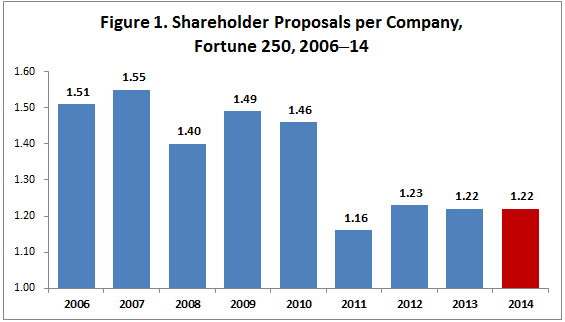
The number of shareholder proposals remained significantly below that witnessed in the five years through 2010. In 2010, Congress enacted the Dodd-Frank law,[15] which mandated that companies hold annual, biennial, or triennial shareholder advisory votes on executive compensation[16]—an issue that certain shareholder activists had long sought through shareholder proposals. Since 2010, the number of shareholder proposals related to executive compensation has declined because this issue no longer shows up as a shareholder proposal—being obviated by the Dodd-Frank rule—and because activists focused on executive-compensation issues may focus their energies on convincing companies and other shareholders through the advisory votes, rather than by introducing shareholder proposals.
Voting Results
In 2014, only 4 percent of shareholder proposals received majority shareholder support, down from 7 percent in 2013. The fraction of shareholder proposals winning the support of most shareholders in 2014 was significantly below that in any of the preceding eight years covered in the ProxyMonitor.org database (Figure 2).
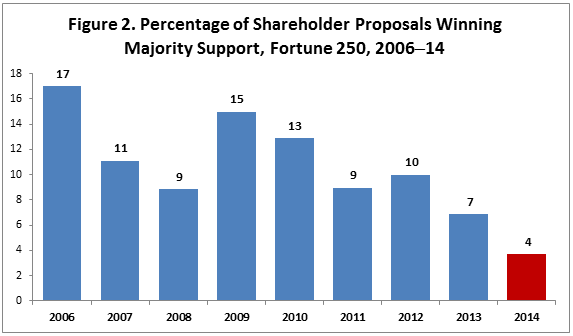
This decrease is explained in part by a shifting mix in shareholder-proposal types. For example, proposals seeking to elect all directors annually rather than in staggered terms (i.e., proposals to “declassify the board”) have commonly received majority support from shareholders, but none was introduced in 2014—partly because such practice has become significantly more commonplace among large publicly traded companies[18] and partly because companies facing such proposals have become substantially more likely to agree to this change on their own.[19] In addition, shareholder enthusiasm has apparently waned for certain shareholder proposals that in past years received majority support, such as those seeking to require directors to receive a majority (as opposed to a plurality) of the shareholder vote to be elected and those seeking to empower shareholders to call special meetings or act outside of annual meetings through written consent. In 2014, none of the proposals introduced on these topics received the support of a majority of shareholders.
Proposal Subject Matter
The percentage of shareholder proposals involving social-policy concerns with only an attenuated connection to shareholder value—such as corporate political spending or lobbying, environmental issues, or human rights—was significantly higher in 2014 (47 percent) than across the full 2006–14 period covered by the ProxyMonitor.org database (39 percent) (Figure 3 and Figure 4).
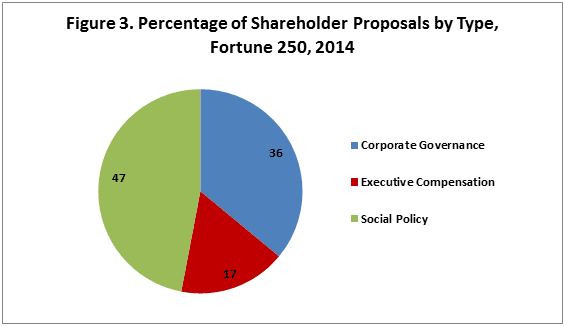
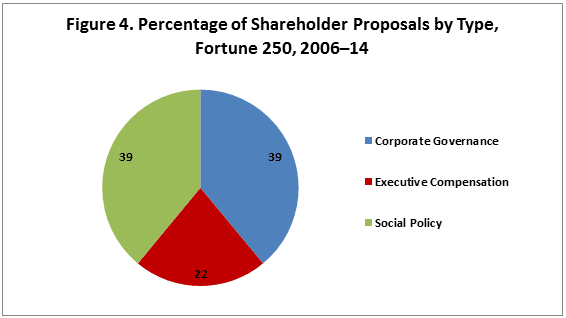
Proposals relating to process-based corporate-governance concerns—such as board structure and the rules for electing directors and taking other shareholder actions—constituted only 36 percent of shareholder proposals in 2014, down from 39 percent during the 2006–14 period. In part, this decrease is explained by the fact that many companies have already adopted some of the activists’ proposals most likely to garner majority-shareholder support, as discussed. Proposals relating to executive compensation constituted 17 percent of shareholder proposals in 2014, down from 22 percent during the 2006–14 period. As noted, this drop is largely a result of the fact that Dodd-Frank’s rule mandating shareholder advisory votes on executive compensation has supplanted shareholder proposals seeking that mechanism.
In 2014, 22 percent of shareholder proposals appearing on Fortune 250 companies’ proxy ballots involved corporate political spending or lobbying, which constituted a plurality of both social-policy-oriented shareholder proposals and proposals overall (Figure 5). The fraction of shareholder proposals on this topic was up slightly from 21 percent in 2013, and double that seen across the full 2006–14 period (11 percent) (Figure 6).
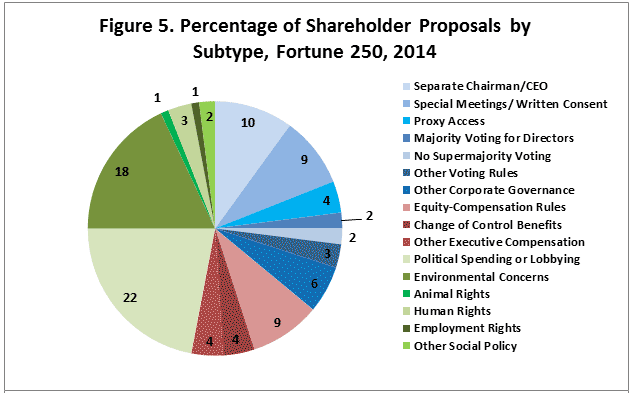
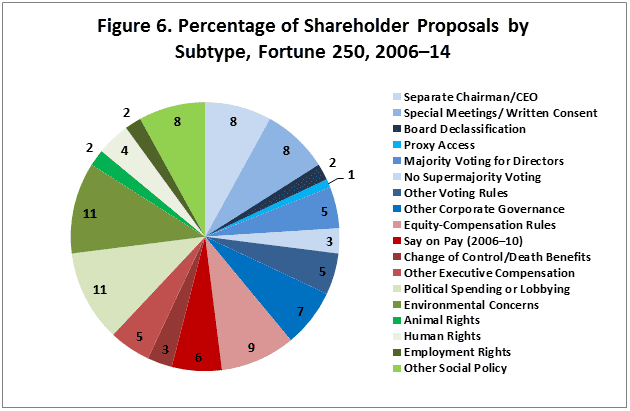
Environmental issues—including greenhouse-gas emissions, hydraulic fracturing to extract natural gas, genetically modified organisms in food, and general “sustainability” concerns—were also commonly introduced as shareholder proposals in 2014, constituting 18 percent of all such proposals, up from 11 percent during the 2006–14 period. Other commonly introduced proposals in 2014—as across the broader 2006–14 period—included those seeking to separate the company’s chairman and CEO roles (10 percent of all shareholder proposals), to enable shareholders to call special meetings or act through written consent (9 percent), and to change corporate equity-compensation plans (9 percent).
In 2014, seven corporate-governance-related shareholder proposals received majority support from shareholders: three calling on the company to remove supermajority voting provisions from its bylaws (of six introduced and voted upon); two seeking to permit the company’s shareholders to call special meetings (of eight introduced and coming to a vote); one calling on the company to split its chairman and CEO roles (of 32 introduced); and one seeking to block prospective “poison pills” in the event of a possible takeover bid (without board opposition).
Two of 27 shareholder proposals involving the company’s equity-compensation plan received majority shareholder support, as did one social-policy-related proposal, a “laudatory resolution” in support of animal-welfare standards introduced by the Humane Society at Kraft Foods, which received the support of 76 percent of shareholders after the board of directors supported the proposal. As noted in the 2014 Proxy Monitor Fall Report,[20] no social-policy-related proposal has received majority shareholder support over board opposition at any Fortune 250 company during the 2006–14 period, including the many proposals involving corporate political spending or lobbying.
Proposal Sponsorship
In 2014, three individual investors and their family members—John Chevedden, the father-son team of William and Kenneth Steiner, and the husband-wife team of James McRitchie and Myra K. Young—sponsored 31 percent of shareholder proposals at the 250 largest publicly traded companies (Figure 7). The fraction of shareholder proposals sponsored by this “corporate gadfly”[21] group is up somewhat, compared with the broader 2006–14 period (28 percent) (Figure 8), notwithstanding the fact that two previously active gadflies, octogenarians Evelyn Davis and Emil Rossi, have largely ceased sponsoring shareholder proposals. (Davis introduced 21–25 shareholder proposals annually at Fortune 250 companies during 2006–11, and only one in 2014; Rossi and his family members introduced 15–20 proposals annually during 2006–09, but none in 2014.)
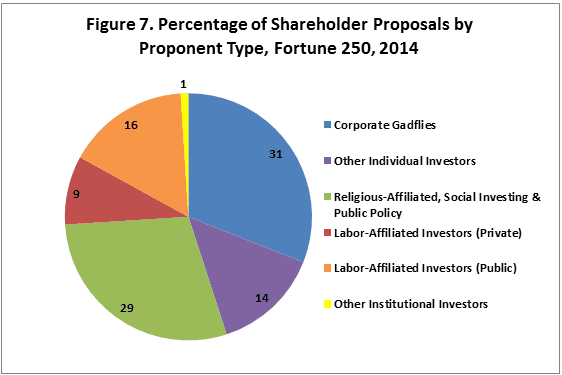
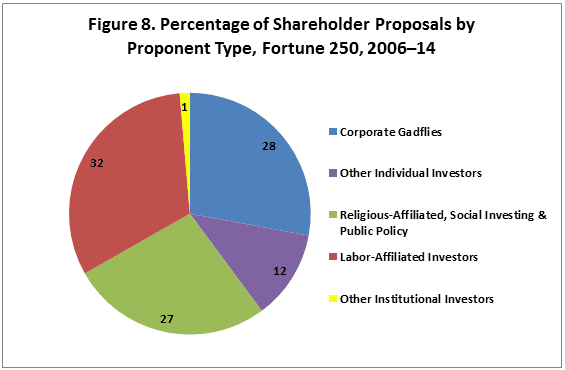
Institutional investors with a social, policy, or religious purpose or orientation—including various “social investing” funds[22] and various religious institutions’ pension funds (chiefly for Catholic orders of nuns)—introduced 29 percent of shareholder proposals on Fortune 250 companies’ proxy ballots in 2014, up from 27 percent in the 2006–14 period. These groups’ shareholder proposals tend to involve social-policy concerns. Over time, social-investing funds have played a more active role, relative to religious institutions’ pension funds.
The percentage of shareholder proposals sponsored by pension funds—including those for state and municipal employees, as well as multiemployer plans for labor unions like the American Federation of Labor–Congress of Industrial Organization (AFL-CIO) and American Federation of State, County, and Municipal Employees (AFSCME)—fell to 25 percent in 2014, compared with 32 percent during the full 2006–14 period. The decline in labor-related shareholder-proposal activism occurred among private-sector funds, such as the AFL-CIO and AFSCME; these investors sponsored only 9 percent of shareholder proposals in 2014, down significantly from historical norms. Although some state and municipal public-employee pension funds were less active in 2014—including those that had worked with Harvard Law professor Lucian Bebchuk to sponsor “board declassification” proposals across multiple companies—as a group, these investors sponsored 16 percent of all proposals, led by the pension funds for public employees in New York City and State.
In 2014, as is the case historically, fewer than 1 percent of shareholder proposals were sponsored by institutional investors without a connection to public- or private-employee pensions or a social, religious, or policy orientation.
Executive-Compensation Advisory Votes
In 2014, only three Fortune 250 companies failed to obtain majority support from shareholders in executive-compensation advisory votes: Oracle (46 percent), Staples (46 percent), and TRW Automotive Holdings (44 percent). In comparison, five companies fell below the majority threshold in 2012 and 2013, respectively. Oracle received less than a majority for the second consecutive year, though it did attract modestly more shareholder support in 2014 (up from 43 percent in 2013). (Oracle cofounder and CEO Larry Ellison owns approximately 25 percent of the company’s outstanding shares.)
II. Snapshot: 2015 Early Filings and Voting Returns
Although most publicly traded companies hold annual meetings between mid-April and mid-June, 20 Fortune 250 public companies had held annual meetings by April 3, 2015, and another 78 had filed proxy materials with the SEC as of that date, for later meetings. The mix of companies with earlier meetings varies from the total: historically, these companies have faced fewer shareholder proposals than the average company in the Proxy Monitor database, and institutional investors, both labor-affiliated and social-policy-oriented, have tended to be less active in sponsoring proposals at companies meeting in the first quarter, as opposed to the main proxy season. With those caveats in mind, the early results can help illuminate how the 2015 proxy season is shaping up.
Early Filing Data
The average Fortune 250 company filing proxy materials to date in 2015 has faced 0.96 shareholder proposals, significantly below the average for all of 2014 (1.22 shareholder proposals per company) but in line with the early period last year (0.98 proposals). In contrast with 2014, a larger fraction of shareholder proposals introduced to date in 2015 have involved corporate-governance issues (47 percent), and a smaller fraction have involved social-policy concerns (38 percent) (Figure 9).
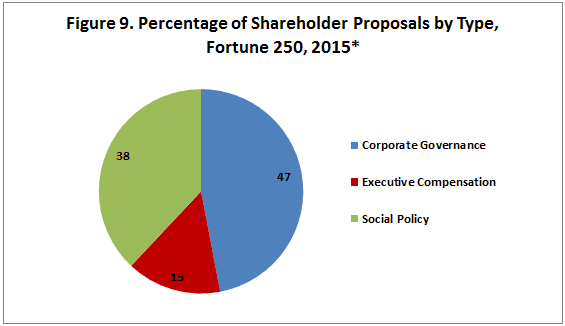
Social-policy-related shareholder proposals are down not only overall but also with respect to the two most frequently introduced classes of proposal: political spending or lobbying (18 percent, down from 22 percent in all of 2014); and environmental issues (14 percent, down from 18 percent in all of 2014). However, most of the large energy companies, which tend to face multiple environment-related proposals, had yet to file proxy materials as of April 3, so the number of such proposals can be expected to rise, proportionately, as the proxy season unfolds. Other classes of shareholder proposals frequently introduced in 2015 include separating the company’s chairman and CEO roles (12 percent, up from 10 percent in 2014) and empowering shareholders to call special meetings or act through written consent (12 percent, up from 9 percent in 2014).
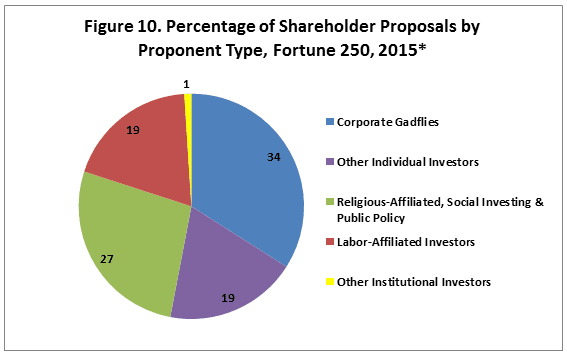
Among the early-filing companies in 2015, corporate gadflies Chevedden, Steiner, and McRitchie/Young have sponsored 34 percent of all shareholder proposals, as compared with 31 percent in all of 2014. Social-policy-oriented investors have sponsored 27 percent of all shareholder proposals and labor-affiliated pension funds 19 percent, as compared with 29 percent and 25 percent, respectively, in all of 2014; because such investors’ shareholder-proposal sponsorship has traditionally been focused on the main proxy season, however, it is too early to conclude that these investor classes have decreased their emphasis on filing shareholder proposals. The shareholders most active in sponsoring proposals to date have been John Chevedden (12 proposals), William and Kenneth Steiner (10), James McRitchie and Myra Young (six), and the New York City pension funds (six). Fourteen of the 22 shareholder proposals sponsored by institutional investors with a social or policy orientation have been sponsored by social-investing funds, spread across eight different investors.
Early Voting Results
Among the 20 Proxy Monitor companies to have held annual meetings by April 3, one of 22 shareholder proposals received the support of a majority of shareholders (5 percent of proposals). On average, each shareholder proposal was supported by 25 percent of shareholders, in keeping with historical norms. With 92 percent of Fortune 250 companies yet to hold annual meetings, it is, of course, too early to draw definitive voting trends.
The proposal to receive majority support, a proxy-access proposal introduced at Monsanto by corporate gadfly John Harrington (who also runs a social-investing fund, Harrington Investments), received the support of 53 percent of shareholders at the company’s January 30 meeting. The other proxy-access proposal coming to a vote to date, introduced at Apple by corporate gadfly James McRitchie, received the support of 39 percent of shareholders at the company’s March 10 meeting. Proposals seeking to empower shareholders to act outside of annual meetings by written consent were introduced by Kenneth Steiner at Amerisource Bergen and by John Chevedden at Hewlett-Packard; each received the support of just under 43 percent of voting shareholders. No other shareholder proposal voted on to date at a Fortune 250 company has received the support of more than 35 percent of voting shareholders.
III. Looking Ahead: What to Monitor in the Coming Weeks
During April 16–30, 44 Fortune 250 companies will hold annual meetings—twice as many as have met to date through all of 2015. Of these, seven companies face three or more shareholder proposals: AT&T, Boeing, Citigroup, IBM, General Electric, Honeywell, and Johnson & Johnson.
At these meetings, companies will face votes on: 12 proposals involving corporate political spending or lobbying; eight proposals seeking to split the chairman and CEO roles; six proposals seeking proxy access; six proposals seeking to modify incentive-compensation plans to increase boards’ discretion to recoup incentive-compensation grants in the event of corporate misconduct; six proposals seeking to empower shareholders to act outside of annual meetings through written consent; four proposals involving environmental concerns; three proposals seeking to empower shareholders to call special meetings; and three proposals concerning the vesting of employee-compensation awards.
Proxy Access
For the 2015 proxy season, New York City comptroller Scott Stringer, newly elected in 2013, announced that New York City’s massive pension funds, which he manages,[23] would be introducing 75 proxy-access proposals at companies as part of a larger campaign that he has dubbed the “Boardroom Accountability Project.”[24] Four of these proposals are among the eight proxy-access proposals to have been introduced at the 98 Fortune 250 companies in the ProxyMonitor.org database that filed proxy statements by April 3.
Six of these proposals are coming up for a vote during April 16–30, including four sponsored by the New York City funds and two proxy-access proposals sponsored by corporate gadflies Harrington and McRitchie:
- American Electric Power, April 21
- PACCAR, April 21
- AES, April 23
- Citigroup, April 28
- Coca-Cola, April 29
- Marathon Oil, April 29
Splitting Chairman and CEO Roles
Although labor-affiliated pension funds were very active in sponsoring shareholder proposals seeking to split the company’s chairman and CEO roles in 2012 and 2013, they took a significantly less active role in 2014—perhaps owing to shareholders’ general reluctance to support such a one-size-fits-all governance rule. In 2015, these proposals have been sponsored exclusively by individual investors.
Eight of these shareholder proposals are going to be considered by shareholders at Fortune 250 companies’ meetings during April 16–30, with corporate gadflies Gerald Armstrong, John Chevedden, and Kenneth Steiner each sponsoring two proposals. The forthcoming votes on proposals to split the chairman and CEO roles are:
- U.S. Bancorp, April 21
- Textron, April 22
- Johnson & Johnson, April 23
- Abbott Laboratories, April 24
- Boeing, April 27
- Honeywell, April 27
- Praxair, April 28
- Wells Fargo, April 28
Political Spending and Lobbying
While proposals seeking to split the chairman and CEO roles are being introduced by corporate gadflies in 2015 (and those seeking proxy access introduced by a mix of gadflies and the New York City pension funds), proposals concerning corporations’ political spending and lobbying have been sponsored by a mix of labor-affiliated pension funds and institutional investors with a social, religious, or policy focus. Only one shareholder, the Philadelphia Public Employee Retirement System, has sponsored more than one of the proposals up for a vote in the latter half of April. Other sponsors include the labor-affiliated Change to Win Investment Group, the Massachusetts Laborers’ Pension Fund, and the United Autoworkers Retiree Medical Benefit Trust; the social-investing funds Northstar Asset Management, Trillium Asset Management, and Walden Asset Management; and the religious-affiliated Congregation of Sisters of St. Agnes.
Two-thirds of this class of proposals have sought disclosure of corporate spending on groups that are involved in lobbying, as well as on those that are involved in spending on politics—consistent with the trend in 2013 and 2014 toward such proposals that are not limited to corporate giving to groups that spend on campaigns. Because corporations’ own lobbying expenditures are already disclosed under federal law,[25] these proposals are designed principally to ferret out corporate membership in various trade associations organized under Section 501(c)(6) of the Internal Revenue Code.[26]
The following companies face proposals concerning political spending or lobbying at their upcoming meetings:
- Johnson & Johnson, April 23
- Lockheed Martin, April 23
- Pfizer, April 23
- AT&T, April 24 (two proposals: one on political spending, one on lobbying)
- Boeing, April 27
- Honeywell, April 27
- BB&T, April 28
- Citigroup, April 28
- IBM, April 28
- Wells Fargo, April 28
- Fluor, April 30
Other Issues
As has been the case in recent years, proposals seeking the ability for shareholders to act outside of annual meetings through written consent, sponsored principally by corporate gadflies, are among the more common class of shareholder proposals on upcoming 2015 proxy ballots. Among the six proposals scheduled for a vote at Boeing, General Electric, Honeywell, IBM, Kimberly-Clark, and Lockheed Martin are two sponsored by John Chevedden and one each by Myra Young and William Steiner. In 2014, none of the 20 written-consent proposals introduced on Fortune 250 proxy ballots received the support of a majority of shareholders, which represented a shift from earlier years, when such ballot items regularly received majority backing.
After the New York City pension funds successfully pressed six companies in 2014 to adopt or amend their clawback policies, allowing recoupment of incentive compensation paid to corporate executives in the event of misconduct,[27] it is unsurprising that such proposals have become commonplace in 2015. In addition to proposals introduced by the New York City pension funds at Boeing and BB&T (meeting April 27 and 28, respectively), corporate gadflies have started to sponsor these proposals, including one by John Chevedden at Edison International (meeting April 23) and one by Kenneth Steiner at Textron (April 22).
Although such recoupment provisions are intended to discourage corporate wrongdoing, they may also blunt the effectiveness of incentive-compensation programs by introducing largely uncontrollable risks to the executives—at least where such policies would hold corporate executives strictly responsible for conduct for which they have no personal knowledge or involvement, given the broad array of conduct that has triggered corporate civil and criminal settlements with the government in recent years.[28] The New York City pension funds expressly advocate adopting policies that recoup incentive compensation based on “supervisory failures,” without the executive’s personal knowledge or involvement.[29]
Another type of proposal that has been commonly introduced this proxy season concerns accelerated vesting of employees’ equity compensation—known by detractors as “golden parachutes.” Kenneth Steiner has introduced proposals at both General Electric (meeting April 22) and IBM (meeting April 28) seeking to limit accelerated vesting of equity awards in the event of a change in corporate control, and the AFL-CIO has introduced a proposal at Citigroup (April 28) asking the board to report on accelerated vesting clauses for employees who enter government service.
Although critics of accelerated vesting view such clauses as unnecessary payouts to management, they have defensible rationales. In general, equity awards vesting early in the event of a corporate change in control are intended to ameliorate agency costs that deter management from supporting mergers and acquisitions that increase share value, due to their loss of employment; and accelerated vesting of equity awards for government service is intended to eliminate potential conflicts of interest that would create problems under government ethics rules.
Finally, although only four shareholder proposals involving environmental concerns are coming to a vote during April 16–30, more such proposals will doubtless be introduced at the large energy companies that tend to meet later in the proxy season. Marathon Oil and Marathon Petroleum, both meeting on April 29, received proposals related to climate change, sponsored by religious-affiliated investors. One of these, sponsored by the Mercy Investment Program at Marathon Petroleum, called on the company to establish goals for reducing greenhouse-gas emissions—a proposal seen last year at that company, as well as at ConocoPhillips, DISH Network, Dominion Resources, ExxonMobil, HollyFrontier, Phillips 66, and Valero Energy.
These proposals, like all policy-related shareholder proposals opposed by corporate boards, will inevitably fail to receive the support of a majority of shareholders—but they bear watching: they represent a continuing tactic by shareholder activists to affect corporate policy for reasons of public policy rather than shareholder value.
IV. Legal and Regulatory Environment and Analysis
Investors and corporate boards have faced substantial new uncertainties as they entered the 2015 proxy season. Institutional investors and the proxy advisory firms upon which they regularly rely must wrestle with the implications of the new SEC staff guidance on their obligations. Boards have had to react to legal and regulatory actions that have thrown into question long-standing interpretations of the SEC’s “ordinary business decision” and “conflicting proposal” rules that have traditionally circumscribed the shareholder-proposal process.
Proxy Advisory Guidance
On June 30, 2014, the SEC staff issued a legal bulletin that clarified the fiduciary obligations of institutional investors voting their shares in publicly traded companies, the duties of accuracy and disclosure that apply to proxy advisory firms, and the obligations and rights of issuing corporations.[30] The rules are intended to increase the efficiency and transparency of shareholder voting, in partial response to critics, including this report’s author, SEC commissioner Daniel Gallagher,[31] and others.
In essence, shareholder voting suffers from a market failure: diversified investors face thousands of proxy ballot items but generally receive little to no return from voting their shares. Institutional investors that compete fiercely for capital in the broader marketplace, such as mutual funds and hedge funds, gain no competitive advantage from being “better” voters than other funds, so they have an incentive to free ride on others’ decisions. In practice, that has meant that many institutional investors have discharged their fiduciary voting obligations by outsourcing their votes to proxy advisors.
Such outsourcing is done on the cheap: only two proxy advisors control most of the market for these services; and the larger of the two, ISS, is a 700-person operation that generates only $122 million in annual revenues,[32] less than $80 million of which comes from advisory services[33] — even as it casts some 7 million ballots representing 2.7 trillion shares.[34] The remainder of ISS’s revenues comes primarily from the company’s “corporate sales” division, which offers governance and proxy advice to corporations—including to the companies for which institutional investors hire ISS to advise them on how to vote in proxy matters.
Such conflicts raise obvious concerns, especially given the massive influence that ISS and the other large proxy advisor, Glass Lewis, have on shareholder voting. Empirical evidence suggests that, controlling for other factors, an ISS “for” or “against” recommendation on a shareholder proposal moves the shareholder vote by an average of 15 percentage points[35]—making ISS alone the essential equivalent of a 15 percent owner of the stock market.
The SEC’s new rules, adopted in June 2014, attempt to clarify the duties of investment advisors and proxy advisors. Among the new rules:
- Investment advisors have fiduciary duties of loyalty and care in voting their shares.
- Investment advisors cannot rely blindly on proxy advisory firms but must continue to oversee their work, and the advisors must work to correct material errors.
- Investment advisors may decide not to vote all proxies and limit their votes to certain companies and certain issues.
- Investment advisors may decide to vote with management on all proposals or under certain conditions, or to vote for or against all shareholder proposals made by a particular sponsor.
- Proxy advisory firms must comply with proxy rules if they execute votes for clients.
- Proxy advisory firms must disclose material conflicts, including business relationships with companies upon whose shares they offer voting advice.
Will proxy advisory firms and institutional investors behave differently in light of the new SEC rules? It is plausible that support for certain shareholder resolutions may rise or fall, if institutional investors take advantage of the new rules allowing them to order shares broadly according to proposal sponsor or issue; to not vote their shares; or to vote with management. In addition, proxy advisory firms may alter their practices in line with new rules that create duties of care and disclosure.[36] While only time will tell if shareholder voting changes materially as a result of the new SEC guidance, the 2015 proxy season is a good first test.
Challenges to 14a-8 Ballot-Exclusion Rules
If institutional investors and proxy advisors will be wrestling with the implications of the new proxy advisor rules in 2015, issuing corporations face new uncertainties, legal and regulatory, around SEC regulations that govern when shareholder proposals may be excluded from the ballot. Under these regulations, publicly traded companies may exclude a shareholder proposal under certain conditions, governed by the agency’s Rule 14a-8.[37]
Procedurally, the shareholder has to establish his ownership in the company and meet certain filing deadlines.[38] Substantively, the shareholder proposal cannot be too vague or indefinite; it may not conflict with state law; it may not duplicate or conflict with another ballot proposal; it may not repeat a previous year’s proposal that failed to gain minimal shareholder support; it may not involve the company’s “ordinary business operations”; and it may not ask the company to do something that it has already done or lacks the power to implement.[39] Two of these rules were thrown into doubt heading into the 2015 proxy season—and one remains in doubt as of this writing—following a federal court decision not to treat a retailer’s sale of guns as an ordinary business decision exempt from the shareholder-proposal process (overturned on April 14) and the SEC chairman’s decision to revisit the agency’s “conflicting proposals” rule and hold it in abeyance during the proxy season.
In 2014, Trinity Wall Street[40]—a venerable Episcopal church in downtown Manhattan with a reputation for taking on social concerns—sponsored a shareholder resolution with Wal-Mart asking the board to amend the company’s charter and charge its Compensation, Nominating, and Governance Committee with new oversight duties.[41] Among these duties were issuing public reports on whether the sale of certain products at the company’s stores “especially endangers public safety and well-being” and “would reasonably be considered by many offensive to the family and community values integral to the Company’s promotion of its brand.”[42] Specifically, the proposal asked the company to report on “whether or not the company should sell guns equipped with magazines holding more than ten rounds of ammunition.”[43]
In March 2014, the SEC issued Wal-Mart a no-action letter informing the company that it could exclude Trinity’s proposal because it involved the company’s ordinary business operations.[44] Although the agency typically permits proposals involving social or public concerns, it also has long interpreted shareholder proposals involving a company’s sale of products manufactured by a third party to be excludable by the company.[45] The rationale for such a rule is straightforward: some issue of public concern could be raised about virtually any product in the marketplace, so permitting shareholders to challenge companies about the products they bought or sold but did not themselves produce could render the ordinary-business-exception rule a virtual nullity.
After Wal-Mart decided to exclude Trinity’s proposal from its 2014 proxy ballot, based on the SEC’s determination, the church filed suit in federal court. On November 26, 2014, Judge Leonard P. Stark of the federal district court in Delaware issued an opinion reversing the SEC’s no-action determination and concluding that Trinity’s proposal involved matters of significant social concern rather than ordinary business operations.[46] Wal-Mart appealed, and the Third Circuit heard oral arguments on the case on April 8, 2015,[47] and issued a one sentence order overturning the lower court decision on April 14.[48] The full rationale for the decision is expected to follow; the court presumably expedited its ruling to facilitate Wal-Mart’s annual meeting, which the company typically holds in June, after disseminating its proxy materials in late April.
While the SEC’s application of its ordinary business exception was under challenge in the courts, SEC chairman Mary Jo White ordered the agency staff to report back to the commission on the “proper scope and application” of the conflicting-proposals rule, which is not being enforced in the 2015 proxy season.[49]
In advance of the 2015 proxy season, James McRitchie, who publishes a corporate-governance website[50] and who has been among the most active corporate gadflies filing shareholder proposals in recent years, introduced a proxy-access shareholder at Whole Foods, designating John Chevedden to act as his agent.[51] McRitchie’s proposal called for granting shareholders who held at least 3 percent of the company’s shares for at least three years the ability to nominate directors on the corporation’s proxy ballots. McRitchie’s proposal essentially paralleled the mandatory rule previously adopted by the SEC, Rule 14a-11, which was subsequently thrown out by the D.C. Circuit because of concerns that the rule might hurt ordinary investors at the expense of “investors with a special interest, such as unions and state and local governments whose interests in jobs may well be greater than their interest in share value [and who] can be expected to pursue self-interested objectives rather than the goal of maximizing shareholder value.”[52]
Whole Foods responded by seeking a no-action letter from the SEC, indicating that it would be introducing its own proxy-access rule, which would have higher ownership and holding-period thresholds. On December 1, 2014, the SEC staff issued a no-action letter on the basis that McRitchie’s proposal conflicted with the management proposal.[53] McRitchie appealed to the SEC commissioners to reverse this decision,[53] and on January 16, 2015, SEC chairman White asked the staff to report back on the proper scope and application of the conflicting-proposals rule, with the agency’s Division of Corporation Finance concurrently reporting that it would not be expressing any views on the appropriateness of excluding conflicting proposals from proxy ballots in the interim.[55]
In the wake of this decision, Whole Foods decided to push its annual meeting, originally scheduled for March 10, back to September.[56] Other companies have decided to go forward and introduce their own advisory proposals as competing alternatives to those sponsored by shareholders.[57] Fortune 250 company AES Corporation has responded to a shareholder proposal by John Chevedden, seeking shareholder rights to call special meetings, and a proposal by McRitchie and his wife, Myra Young, seeking proxy-access rights, by placing its own competing proposals on the proxy ballot, offering each right to shareholders, with higher ownership thresholds.[58] The company will hold its annual meeting on April 23.
Conclusion
The 2015 proxy season begins with more uncertainty than at any point since the Proxy Monitor project was launched in 2011. In that year, Dodd-Frank’s rule mandating that companies grant shareholders advisory votes on executive compensation was first implemented, and the SEC’s proposed proxy-access rule was pending appellate court review, which ultimately overturned mandatory proxy access. Since then, executive-compensation advisory votes have become the new normal, with most companies easily winning shareholder approval; whether the benefits of holding these votes exceeds the costs of holding them remains an open question.
Over time, however, increasing evidence has emerged that most shareholders consider the social and policy issues regularly raised in shareholder resolutions inconsistent with maximizing share value. As noted in the fall 2014 Proxy Monitor report,[59] more than 1,000 such proposals have been introduced on Fortune 250 companies’ proxy ballots during 2006–14, and not a single such proposal has won the support of a majority of shareholders over board opposition. Such evidence should be prompting the courts, the SEC, and Delaware and other state legislatures to reconsider the wisdom of allowing shareholders to turn corporate annual meetings into staging grounds for political appeals.
Fortunately, in overturning Judge Stark’s injunction that would have required Wal-Mart to place a proposal involving sale of firearms on its proxy ballot, the Third Circuit decided not to open the playing field for such social activism by making companies vulnerable to shareholder proposals concerning their purchases and sales of products manufactured by third parties, eviscerating the ordinary course of business exception in the process. A contrary decision by the Court of Appeals would have been the biggest opening for social-policy shareholder activism since the 1970 D.C. Circuit opinion in Medical Committee for Human Rights first prompted the SEC to permit social issues on proxy ballots.[60]
Proxy access is the ballot item to watch in 2015, but concerns about proxy access raised by the D.C. Circuit in its 2007 Business Roundtable decision remain trenchant.[61] There is a theoretical basis for permitting large, long-term shareholders to nominate directors without launching a full-fledged proxy fight, but there remains a risk that investors with purposes other than maximizing share value—including public-employee pension funds led by elected partisan politicians—might utilize this process to increase their leverage over companies for social-oriented campaigns harmful to the ordinary diversified investor. The screening mechanisms that the New York City pension funds have announced in deciding which companies to target with proxy-access proposals illuminate these risks: they include issues such as boards of directors’ race and gender diversity, as well as companies’ policies on greenhouse-gas emissions.[62]
How the New York City comptroller’s push for proxy access will shake out and how shareholders will react to the competing proposals now showing up on proxy ballots, thanks to the SEC chairman’s decision to suspend the competing-proposals rule, are among the key things to monitor as the 2015 proxy season unfolds.
About the Author
JAMES R. COPLAND is the director of and a senior fellow with the Manhattan Institute’s Center for Legal Policy, which seeks to develop and communicate thoughtful ideas on how to improve the civil and criminal justice system. Copland oversees the Institute’s corporate governance website, ProxyMonitor.org. In 2011 and 2012, the National Association of Corporate Directors named Copland to its Directorship 100 list, the group’s catalog of the individuals most influential over corporate governance in the United States.
Prior to joining the Manhattan Institute, Copland was a management consultant with McKinsey and Company in New York. He had earlier served as a law clerk for Ralph K. Winter on the United States Court of Appeals for the Second Circuit. Copland received J.D. and M.B.A. degrees from Yale, where he was an Olin Fellow in Law and Economics and an editor of the Yale Journal on Regulation. He also holds an M.Sc. in politics of the world economy from the London School of Economics and a B.A. in economics with highest distinction and highest honors from the University of North Carolina at Chapel Hill, where he was a Morehead Scholar.
- See 17 C.F.R. § 240.14a-8 (2007) [hereinafter “14a-8”]. The federal Securities and Exchange Commission determines the procedural appropriateness of a shareholder proposal for inclusion on a corporation’s proxy ballot, pursuant to the Securities Exchange Act of 1934, Pub. L. No. 73-291, Ch. 404, 48 Stat. 881 (1934) (codified at 15 U.S.C. §§ 78a–78oo (2006 & Supp. II 2009)), at §§ 78m, 78n & 78u; 15 U.S.C. §§ 80a-1 to 80a-64 (2000) (pursuant to Investment Company Act of 1940, Pub. L. No. 76-768, 54 Stat. 841(1940)); but the substantive rights governing such measures and how they can force boards to act remain largely a question of state corporate law; cf. Del. Code Ann., tit. 8, § 211(b) (2009) (noting that in addition to the election of directors, “any other proper business may be transacted at the annual meeting”).
- U.S. Securities and Exchange Commission, Proxy Voting: Proxy Voting Responsibilities of Investment Advisers and Availability of Exemptions from the Proxy Rules for Proxy Advisory Firms, Staff Legal Bulletin No. 20 (IM/CF) (June 30, 2014), https://www.sec.gov/interps/legal/cfslb20.htm [hereinafter “Proxy Rules”].
- See Institutional Shareholder Services, About ISS, https://www.issgovernance.com/about/about-iss (last visited Mar. 31, 2015).
- See James R. Copland et al., Proxy Monitor 2012: A Report on Corporate Governance and Shareholder Activism, 22–23 (Manhattan Inst. for Pol’y Res., Fall 2012).
- See Proxy Rules, supra note 2.
- See Daniel M. Gallagher, Outsized Power & Influence: The Role of Proxy Advisers, Washington Legal Foundation Critical Legal Issues Working Paper Series, No. 187, at 11–15 (Aug. 2014).
- Trinity Wall Street v. Wal-Mart Stores, CA No. 14-405-LPS, D. Del., Nov. 26, 2014 (available online at https://law.justia.com/cases/federal/district-courts/delaware/dedce/1:2014cv00405/54554/65/).
- See No-Action Letter Re: Wal-Mart Stores, Inc., SEC, https://www.sec.gov/divisions/corpfin/cf-noaction/14a-8/2014/
trinitychurch032014-14a8.pdf [hereinafter “Wal-Mart No-Action Letter”] (stating “[W]e will not recommend enforcement action to the Commission if Walmart omits the proposal from its proxy materials in reliance on rule 14a-8(i)(7).”) (last visited Apr. 14, 2015); see also 14a-8, supra note 1 at subsection (i)(7) (indicating that when a “proposal deals with a matter relating to the company's ordinary business operations,” a company may rely on that as a basis for excluding the proposal). - See Appellant's Opening Brief at 4, Trinity Wall Street v. Wal-Mart Stores, Inc., No. 14-4764 (3rd Cir. Jan. 14, 2015) [hereinafter “Wal-Mart Brief”] (available online at https://www.scribd.com/doc/252714806/Wal-Mart-Brief-Related-to-Exclusion-of-Shareholder-Proposal) (last visited Apr. 14, 2015).
- See Michael Chamberlain, Socially Responsible Investing: What You Need to Know, Forbes, Apr. 24, 2013, https://www.forbes.com/sites/feeonlyplanner/2013/04/24/socially-responsible-investing-what-you-need-to-know (defining “socially responsible investing” as “promot[ing] concepts and ideals that [socially responsible investors] feel strongly about” through investment in companies, communities, and shareholder advocacy).
- See Public Statement, Statement from Chair White Directing Staff to Review Commission Rule for Excluding Conflicting Proxy Proposals, SEC (Jan. 16, 2015), https://www.sec.gov/news/statement/statement-on-conflicting-proxy-proposals.html#.VST9b_nF_Wt; see also 14a-8, supra note 1, at subsection (i)(9) [hereinafter “SEC Public Statement”] (“If the proposal directly conflicts with one of the company's own proposals to be submitted to shareholders at the same meeting”).
- See id.
- Under the Dodd-Frank Wall Street Reform and Consumer Protection Act of 2010, publicly traded companies must hold shareholder advisory votes on executive compensation annually, biennially, or triennially, at shareholders’ discretion. See Pub. L. No. 111-203, 124 Stat. 1376, §951 (2010) [hereinafter “Dodd-Frank Act”].
- See Proxy Monitor, Reports and Findings, https://proxymonitor.org/Forms/reports_findings.aspx (last visited Apr. 14, 2015).
- See Dodd-Frank Act, supra note 13.
- See id. at 15 U.S.C. § 78n–1.
- In determining shareholder support for shareholder proposals, the Manhattan Institute counts votes consistent with the practice dictated in a company’s bylaws, as governed by state law. Some companies measure shareholder support by dividing the number of votes for a proposal by the total number of shares present and voting, ignoring abstentions. Other companies measure shareholder support by dividing the number of favorable votes by the number of shares present and entitled to vote—thus including abstentions in the denominator of the tally. Neither practice necessarily skews shareholder votes in management’s favor: whereas the latter method makes it relatively more difficult for precatory shareholder resolutions to obtain majority support, it also makes it more difficult for management to win shareholder backing for its own proposals, such as equity compensation plans.
Shareholder-proposal activists prefer to exclude abstentions consistently in tabulating vote totals, without regard to corporate bylaws—understandably, since this methodology inflates apparent support for their proposals. Such a methodology, however, is inconsistent with state and federal law. The SEC’s Schedule 14A specifies that for “each matter which is to be submitted to a vote of security holders,” corporate proxy statements must “[d]isclose the method by which votes will be counted, including the treatment and effect of abstentions and broker non-votes under applicable state law as well as registrant charter and bylaw provisions”—clearly indicating that corporations can adopt varying counting methodologies in assessing shareholder votes and that state substantive law governs the parameters of vote calculation. Schedule 14A, Item 21. Voting Procedures, https://www.law.cornell.edu/cfr/text/17/240.14a-101 (last visited Sept. 9, 2014).
Under the state law of Delaware, in which most large public corporations are chartered, “the certificate of incorporation or bylaws of any corporation authorized to issue stock may specify the number of shares and/or the amount of other securities having voting power the holders of which shall be present or represented by proxy at any meeting in order to constitute a quorum for, and the votes that shall be necessary for, the transaction of any business.” Del. Gen. Corp. L. § 216. As a default rule, absent a bylaw specification, Delaware law specifies that “in all matters other than the election of directors,” companies should count “the affirmative vote of the majority of shares of such class or series or classes or series present in person or represented by proxy at the meeting,” id. at 216(4)—the precise inverse of shareholder-proposal activists’ preferred counting rule.
The SEC staff has adopted a rule for the very limited purpose of determining whether a proposal has met the “resubmission threshold” to qualify for inclusion on the next year’s corporate ballot—a permissive standard requiring merely a minimum 3 percent, 6 percent, or 10 percent vote, respectively, in successive years; see Amendments to Rules on Shareholder Proposals, Exchange Act Release No. 40,018; 63 Fed. Reg. 29,106, 29,108 (May 28, 1998) (codified at 17 C.F.R. pt. 240)—“[o]nly votes for and against a proposal are included in the calculation of the shareholder vote of that proposal,” ignoring abstentions. SEC Staff Legal Bulletin No. 14, F.4., July 13, 2001,https://www.sec.gov/interps/legal/cfslb14.htm (last visited Sept. 9, 2014). Because this is a staff rule not voted on by the commission; because it exists for a limited purpose (with multiple rationales, including reducing workload in processing 14a-8 no-action petitions and adopting a permissive standard for ballot inclusion); and because it contravenes clear and long-standing deference to substantive state law in the field of corporate governance, the notion that this limited SEC staff vote-counting rule should dictate counting methodology, irrespective of state law and governing corporate bylaws, is untenable.
In late 2014, the social-policy-oriented Investor Voice introduced three shareholder proposals at ConAgra, FedEx, and Oracle seeking to amend the corporations’ bylaws and adopt the shareholder activists’ preferred vote-tabulating methodology (i.e., excluding abstentions from the denominator in calculating vote totals). Shareholders overwhelmingly rejected these proposals, which received 12 percent, 8 percent, and 8 percent shareholder support, respectively. - According to the Harvard Shareholder Rights Project, which has advocated the proposal to declassify staggered boards, two-thirds of the S&P 500 companies that had classified boards as of 2012 have now changed their practice. See 121 Companies Agreeing to Move toward Annual Director Elections, https://srp.law.harvard.edu/companies-entering-into-agreements.shtml (last visited Apr. 14, 2015).
- Among companies facing board-declassification proposals introduced through efforts of the Harvard Shareholder Rights Project, 56 percent agreed to declassify their boards in 2012, 68 percent in 2013, and 76 percent in 2014. See id.
- James R. Copland & Margaret M. O’Keefe, Proxy Monitor 2014: A Report on Corporate Governance and Shareholder Activism (Manhattan Inst. for Pol’y Res., Fall 2014), https://www.proxymonitor.org/Forms/pmr_09.aspx#notes [hereinafter “Copland Fall 2014”].
- See James R. Copland, Frequent Filers: Shareholder Activism by Corporate Gadflies (Manhattan Inst. for Pol’y Res., Finding 5, 2014), https://proxymonitor.org/Forms/2014Finding5.aspx#notes (defining corporate gadflies as “[i]ndividuals who repeatedly file common proposals, year after year, across a broad class of companies.”).
- See Shauna Carther, Socially Responsible Mutual Funds,
https://www.investopedia.com/articles/mutualfund/03/030503.asp#ixzz3XKMsfTn0 (last visited Apr. 14, 2015) (defining these funds as those that “hold securities in companies that adhere to social, moral, religious or environmental beliefs.”). - The elected New York City comptroller manages the City’s pension funds, which serve to provide retirement benefits for the City’s public employees. See Office of the State Comptroller, Fiduciary Responsibilities of the Comptroller, https://www.osc.state.ny.us/pension/fiduciary.htm (last visited Sept. 9, 2014). Full fiduciary authority over the funds rests with various boards comprised of political and union delegates. For example, the board of the $46 billion Teachers’ Retirement System (TRS) includes the comptroller, two mayoral delegates, a delegate from the education chancellor, and three teacher delegates. See TRSNYC, Our Retirement Board, https://www.trsnyc.org/trsweb/aboutUs/ourRetirementBoard.html (last visited Sept. 9, 2014). The board of the $43 billion New York City Employees’ Retirement System (NYCERS) includes the comptroller, the public advocate, a mayoral representative, each of the five New York City borough presidents, and three union delegates. See NYCERS, Board of Trustees, https://www.nycers.org/(S(azvv04mpy1qd2j5515dyny55))/about/Board.aspx (last visited Sept. 9, 2014).
- See New York City Comptroller, Boardroom Accountability Project, https://comptroller.nyc.gov/boardroom-accountability/ (last visited Apr. 14, 2015); see also Press Release, Comptroller Stringer, NYC Pensions Funds Launch National Campaign To Give Shareowners A True Voice In How Corporate Boards Are Elected: New York City Pension Funds File 75 Proxy Access Shareowner Proposals to Kick Off the Boardroom Accountability Project, https://comptroller.nyc.gov/newsroom/comptroller-stringer-nyc-pension-funds-launch-national-
campaign-to-give-shareowners-a-true-voice-in-how-corporate-boards-are-elected/ [hereinafter “Stringer Press Release”] (last visited Apr. 14, 2015). - See 2 U.S.C. § 1605 (2007).
- I.R.C. § 501(c)(6).
- NYC Comptroller, 2014 Shareowner Initiatives of the New York City Pension Funds, https://comptroller.nyc.gov/reports/shareowner-initiatives/ (last visited Apr. 14, 2015). The six companies were Allergan, Halliburton, Lockheed Martin, Northrup Grumman, PNC Financial Services, and United Technologies.
- See generally James R. Copland & Isaac Gorodetski, Without Law or Limits: The Continued Growth of the Shadow Regulatory State, Manhattan Inst. for Pol’y Res., Leg. Pol’y Rep. No. 19 (Mar. 2015), available at https://www.manhattan-institute.org/html/lpr_19.htm#.VS3vE1yR9UQ (last visited Apr. 14, 2015).
- See, e.g., BB&T Corporation, Proxy Statement Pursuant to Section 14(a) of the Securities Exchange Act of 1934 at Proposal 5, available at https://www.sec.gov/Archives/edgar/data/92230/000119312515093618/d857907ddef14a.htm#tx857907_49 (last visited Apr. 14, 2015).
- Proxy Rules, supra note 2.
- See Gallagher, supra note 6.
- See Institutional Shareholder Services, supra note 3; see also MSCI 2013 Annual Report 70, “Summary of Operations,” “Governance,” available at https://files.shareholder.com/downloads/MSCI/3458217323x0x739303/DAB046E7-737E-43C7-9114-040465AD560E
/2013_Annual_Report.pdf. - See id. at 9–10.
- See Institutional Shareholder Services, supra note 3.
- Copland, supra note 4.
- In a fall 2014 event at the Manhattan Institute, the ISS’s Executive Director argued that ISS’s past practice was already in compliance with the new SEC guidance. See Proxy Monitor Conference Event Video (Oct. 2, 2014), available at https://www.manhattan-institute.org/multimedia/events/100214CLP/ (last visited Apr. 14, 2015).
- See 14a-8, supra note 1.
- See id. at subsection (j).
- See id. at subsection (i)(6).
- See Trinity Wall Street, About Trinity Wall Street, https://www.trinitywallstreet.org/about (last visited Apr. 14, 2015).
- See Trinity Wall Street v. Wal-Mart Stores, supra note 7 at 3.
- Id.
- Id.
- See Wal-Mart No-Action Letter, supra note 8.
- See Wal-Mart Brief, supra note 9, at 35.
- See Trinity Wall Street v. Wal-Mart Stores, supra note 7, at 18–22.
- See Press Release, Third Circuit to Hear Oral Argument Tomorrow in Closely Watched Case Involving Proposal by Shareholder Activist, Washington Legal Foundation, Apr. 7, 2015 (available online at https://www.wlf.org/upload/litigation/pressrelease/04072015TrinityArgument.pdf).
- See Trinity Wall Street v. Wal-Mart Stores, Inc., No. 14-4764, 3rd. Cir., Apr. 14, 2015 (available online at https://www.arkansasbusiness.com/public/wmt-trinity.pdf).
- See SEC Public Statement, supra note 11.
- See https://corpgov.net/ (last visited Apr. 15, 2015).
- See James McRitchie, Appeal of No-Action on Proxy Access at Whole Foods Markets, Harvard Law School Forum on Corporate Governance & Financial Regulation, available at https://corpgov.law.harvard.edu/2015/01/13/appeal-of-no-action-on-proxy-
access-at-whole-foods-markets/ (last visited Apr. 15, 2015). - Bus. Roundtable v. S.E.C., 647 F.3d 1144, 1152 (D.C. Cir. 2011).
- See No-Action Letter Re: Whole Foods, Inc., SEC,
https://www.sec.gov/divisions/corpfin/cf-noaction/14a-8/2014/jamesmcritchie120114.pdf (last visited Apr. 15, 2015). - See Appeal Request Letter from James McRitchie to SEC (Dec. 23, 2014) (available online at https://corpgov.net/wp-content/uploads/2014/12/McRitchieAppealNo-action12-23-2014.pdf) (last visited Apr. 15, 2015).
- See SEC Public Statement, supra note 11.
- See Whole Foods Pushes Annual Meeting to September after SEC Move, Reuters (Feb. 28, 2015, 8:36 AM), https://www.reuters.com/article/2015/02/28/whole-foods-mrkt-shareholders-meeting-idUSL1N0W20DI20150228.
- See Paul Hodgson, At Whole Foods, Chipotle, and Others, Shareholders Prepare for Battle, Fortune (Feb. 3, 2015, 1:00 PM), https://fortune.com/2015/02/03/whole-foods-chipotle-proxy-access/.
- See, e.g., The AES Corporation, Proxy Statement Pursuant to Section 14(a) of the Securities Exchange Act of 1934 at Proposal 9, available at https://www.sec.gov/Archives/edgar/data/874761/000087476115000014/a2015proxystatement.htm#sc8ca5e5c99f0474aa727f4ad1cbb315c (last visited Apr. 14, 2015).
- Copland Fall 2014, supra note 20.
- See Med. Comm. for Human Rights v. SEC, 432 F.2d 659, 682 (D.C. Cir. 1970) (remanding to the SEC for reconsideration a no-action letter that would have permitted Dow Chemical to exclude from its proxy statement a shareholder proposal involving its sale of napalm, which was controversial for its use in the Vietnam War), aff’d 404 U.S. 403 (1972) (affirmed for mootness, after Dow had included the resolution on its proxy). The SEC previously had a rule that a corporation could exclude a shareholder proposal from the proxy ballot “[i]f it clearly appears that the proposal is submitted by the security holder . . . primarily for the purpose of promoting general economic, political, racial, religious, social or similar causes.” Rule 14a-8(c)(2), 17 C.F.R. § 240.14a-8(c) (1970). In its 1970 Medical Committee for Human Rights opinion, the D.C. Circuit sharply questioned this rule as applied in an April 2, 1969, no-action letter to Dow Chemical, stating that “no objection [would] be raised if the Company omits the proposals from its proxy statements for the forthcoming meeting of shareholders,” regarding a shareholder proposal that the company cease manufacturing napalm. 432 F.2d at 663. Technically, the court did not overturn the SEC’s rule but rather remanded to the commission for reconsideration so that “the basis for (its) decision (may) appear clearly on the record, not in conclusory terms but in sufficient detail to permit prompt and effective review.” Id. at 682. Thus, the commission could adopt a similar rule to its earlier Rule 14a-8(c)(2), providing sufficient rationale for the rule, to exclude many social- or policy-oriented proposals. Similarly, because substantive state law governs shareholder rights and responsibilities in this area, Delaware or other states could adopt mandatory or default rules for certain corporate forms that would curtail the practice of permitting social- or policy-oriented shareholder proposals to be introduced.
- See Bus. Roundtable v. S.E.C., supra note 52, at 1152.
- See Stringer Press Release, supra note 24.
Photo: ThinkstockPhotos-71264463
Are you interested in supporting the Manhattan Institute’s public-interest research and journalism? As a 501(c)(3) nonprofit, donations in support of MI and its scholars’ work are fully tax-deductible as provided by law (EIN #13-2912529).